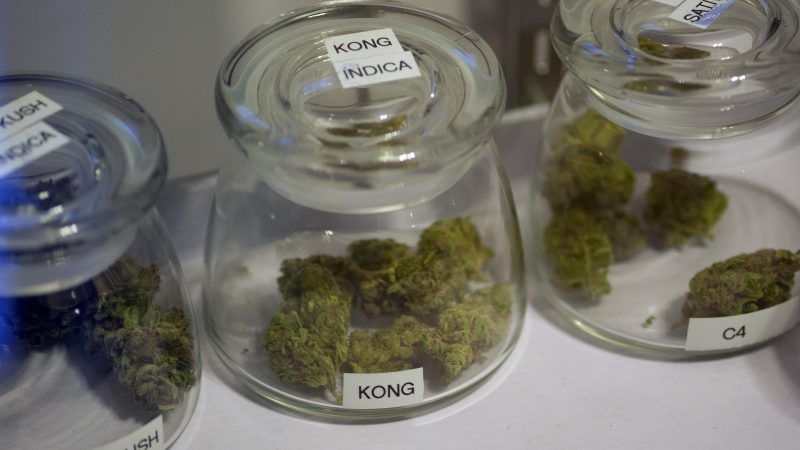Study Finds Marijuana Legalization Had Little Impact on Crime in Colorado or Washington
A comparison with other states finds "no statistically significant long-term effects" on violent or property crime rates.

Last night I debated drug policy at the Soho Forum with Alex Berenson, who claims in his book Tell Your Children that marijuana legalization caused "sharp increases in murders and aggravated assaults" in Colorado and Washington. There were already several reasons to question that claim, and a study published today in Justice Quarterly casts further doubt on it, finding "no statistically significant long-term effects of recreational cannabis laws or the initiation of retail sales on violent or property crime rates in these states."
Ruibin Lu, an assistant professor of criminal justice at Stockton University, and nine collaborators compared monthly crime rates in Colorado and Washington to monthly crime rates in "the 21 states that have not legalized marijuana use for recreational or medical purposes on a large scale." Based on FBI data for 1999 through 2016, they considered what happened after legalization was approved in 2012 and after state-licensed sales to recreational consumers began in 2014. "In general," they report, "the results suggest that marijuana policies and laws have had little effect on crime in Colorado or Washington State."
While both states saw statistically significant increases in property crime immediately after legalization, those changes were short-lived. Compared to the control states, violent crime rose slightly in Colorado and Washington after legalization, but the differences were not statistically significant. After retail sales began, violent crime rates remained essentially the same in both states. That's a far cry from the "sharp increases in murders and aggravated assaults" reported by Berenson.
Although Lu et al. do not separately report homicide rates, their tables show that, compared to the control states, Colorado saw a slight drop in aggravated assaults after legalization and a slight increase after retail sales started. In Washington, there was a slight increase after legalization and essentially no change after the state's pot shops opened. Except for the small post-legalization increase in Washington, none of these differences was statistically significant.
"Our results suggest that there may have been some immediate increases in crime at the point of legalization," Lu et al. say, "yet there have been essentially no long-term shifts in crime rates because of legalization, aside from a decline in burglary in Washington. Though the short-term increases might appear to suggest that marijuana increased crime, we caution against this interpretation as the increases do not reflect permanent shifts (that is, these are shifts in intercepts, not slopes) and could be artificially induced by the small number of time units between legalization and sales…. Following legalization and the start of retail sales (2014), Colorado and Washington follow the same basic pattern as the control states, suggesting that legalization did not result in any major increases or decreases in crime."
Lu et al. caution against drawing conclusions based on simple before-and-after comparisons that do not take into account pre-existing trends or crime rates in states that have not legalized marijuana. "Many politicians are inclined to make use of the earliest available data, and unfortunately too often what is available for public consumption at the outset of change in policy represents research employing limited pre/post analyses or misrepresentation of facts," they write. "A lack of robust research studies and overreliance on limited pre-post analysis perpetuate a state of confusion concerning to what extent legalization influences crime."
Although their study includes just four years of post-legalization data, Lu and her colleagues sought to address the shortcomings of prior analyses by using a more rigorous methodology. "Our results are robust in that we examined the first two states to legalize marijuana and compared them to states with no marijuana laws at all," they write. "Moreover, we estimated our models in a variety of manners, including models with different interruption points, single-group interrupted time series analyses, and as a set of pooled cross-sectional models. None of our models revealed long-term effects of marijuana legalization on serious crime rates."
Berenson argues that marijuana causes psychosis, which leads to violent crime. "The black tide of psychosis and the red tide of violence are rising together on a green wave," he warns in his book. So far the evidence from Colorado and Washington, the first states to legalize marijuana for recreational use, does not seem to support that description.


Show Comments (15)